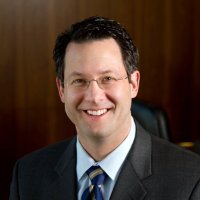UPDATE:
In a last-minute plea deal, Danford Grant admitted guilt to five, amended, third-degree rape charges and one burglary count, and faces 25 years in prison. The surprise hearing took place just minutes before testimony was to begin in the Seattle attorney’s trial Wednesday morning. In a well-practiced tone that Grant has used to defend others in court in the past, he said that, whatever sentence he gets, “My expectations are based on what the law requires…” Judge William Downing asked Grant if he wanted to make a statement about taking responsibility for the crimes. “Not at this time,” the convicted rapist said. “I anticipate I’ll be making a statement at sentencing,” to take place in two weeks.
Over the next few weeks, a King County Superior Court jury is set to hear the strange case of Danford Grant, in which attorneys appear in every scene from the crime to the courtroom.
A Seattle lawyer and former prosecutor with no criminal record, the 49-year-old Grant originally faced trial for nine felonies, but four were dropped Monday. The charges stem from the rape and attempted rape of five Asian women in six incidents at three massage parlors, a car, and one home throughout Seattle, Bellevue and Shoreline during 2011 and 2012.
In settings where sex is often consensual and for sale, Grant allegedly used a knife and threatened the lives of several of the women in a quest for rough sex, prosecutors contend. One was left bleeding from the painful rape. Another felt she would be killed as the naked suspect chased her around the room with an erection. She tried to hold him off by saying she was HIV positive, to which he answered, “Me too.”
The one Thai and four Chinese women, who required interpreters to tell police about their frightening attacks, were particularly vulnerable, police think. Some masseuses, “especially if they are from other cultures,” says Bellevue Police detective Bob Thompson, are “afraid to come forward to report incidents of rape.”
Grant’s law partners at Bailey Grant Onsanger—created in 2012 after the breakup of the vaunted Stafford Frey Cooper firm that made its name defending police officers accused of wrongdoing—stood behind him after his September 2012 arrest. But then the partners locked up his computer, turned it over to police, and dropped Grant from the firm’s name.
The attorney has hired another set of attorneys who may themselves wind up on opposite sides of the witness stand, arguing over whether one of them told Grant’s attorney wife Jennifer—a city prosecutor for 17 years who subsequently became a magistrate on the current Municipal Court bench—to temporarily hide her husband’s Honda, which was allegedly used in the crimes. She was never charged.
The defense team, led by Richard Allen, has used aggressive and imaginative tactics that have included seeking, but failing, to have the case thrown out because a secret videotape from a faulty camera in one of the massage parlors failed to contain images that might have exonerated their client.
Judicial politics also infused the case when the governor last Thursday named the judge assigned to the trial, Mary Yu, to the state Supreme Court—the first Asian and openly gay justice to be appointed. But the case was quickly reassigned to a new judge without a hitch, and jury empanelling is underway.
In a case crowded with lawyers, police moved cautiously, obtaining search warrants supplemented by other search warrants—nine altogether—used to inspect Grant’s home, car, offices, and electronics. Police and prosecutors also took pains—using two teams of investigators—to sort out law firm evidence they encountered that could be considered legally privileged. They’ve issued 4,000 discovery documents and probed the innards of Grant’s cell phone and computers, finding Google searches for “rape scenes.” Prosecutors say they have DNA linking Grant to one of the victims, although it is not sperm, they add, because Grant had a vasectomy in 2009.
The question for the jury is whether police, as the defense contends, have built a mistaken case around the wrong man, or, as his former fellow prosecutors contend, Grant is two men, Jekyll and Hyde—law-practicing attorney and law-breaking serial rapist.
A University of Washington law grad and attorney for 18 years specializing in litigation, the teetotaling Grant is a married father of three—one of his children, a teenage son, from an earlier relationship. He has heavy debt and little savings, he says, and his wealthy, 85-year-old mother Peggy—who owns 240 acres of farmland and lives with Grant and family—posted his $1 million bail and is picking up the defense tab. She calls her son, held on home detention, “a very responsible and law-abiding person.”
Grant suffers from depression, he says, and has been in therapy for eight years. He once had a substance abuse problem but reportedly kicked it decades back. Supporters call him funny and charming, while some co-workers told police he was a womanizer known around the law office as “Dirty Dan” for his suggestive sexual comments. His wife has filed for separation and is seeking to divide their assets and debts.
Grant’s attorneys chose not to comment for this story. His wife, in 2012, said in a court filing that “as a prosecutor and a woman, I am well aware of the seriousness of the allegations against my husband”—they were “distressing and disturbing.” But she expected him to respond responsibly, she said, “taking whatever course of action he and his attorneys decide is best.” It is an unusual rape case and a lawyerpalooza to boot.
randerson@seattleweekly.com
Rick Anderson writes about sex, crime, money, and politics, which tend to be the same thing.








